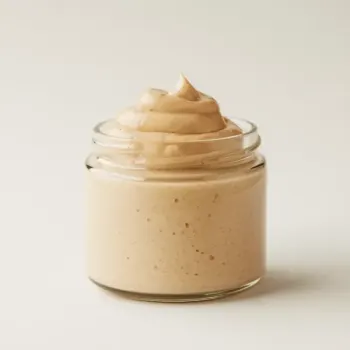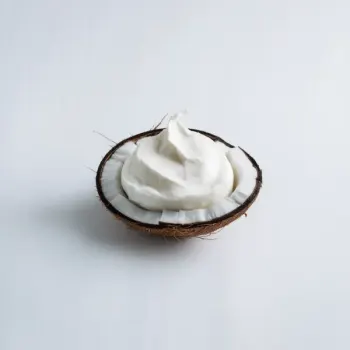Cashew cream and coconut cream are dairy-free alternatives used in cooking for their creamy textures. Cashew cream offers a neutral flavor ideal for subtly enhancing dishes, while coconut cream provides a rich coconut taste, suitable for recipes where a pronounced coconut flavor is desired.

Cashew cream is a smooth concoction made by blending soaked cashews with water. It's known for its rich texture and neutral flavor, making it a versatile base in vegan cooking for sauces, soups, and desserts.

Coconut cream is the thicker, more concentrated portion of coconut milk, derived from the flesh of the coconut. It imparts a tropical flavor and is often used in both sweet and savory dishes, from curries to confectioneries.
Cashew cream boasts a neutral taste and is smoother in texture, making it ideal for recipes that require subtlety. Coconut cream, on the other hand, has a distinct coconut flavor and a heavier consistency, which can dominate the profile of dishes it's used in.

Your ultimate Recipe Box, Meal Planner, and Cooking Class all in one
Perfect for cheesecakes and mousse for its ability to mimic the texture of dairy without overpowering other flavors. Best suited for piña colada ice cream or coconut flan where its bold coconut taste is a desired feature.
Adds a creamy texture to soups like vegan mushroom bisque or tomato basil soup without altering the taste significantly. Enhances Thai curries and tropical soups with its rich consistency and flavor.
Can be used to add creaminess to smoothies and coffee without contributing a competing flavor. Ideal for tropical drinks like piña coladas and creamy cocktails where coconut is a key flavor component.
Both cashew cream and coconut cream are lactose-free and can be suitable for those with dairy allergies or intolerances.
| Nutrient | Cashew Cream ( per 100 grams ) | Coconut Cream ( per 100 grams ) |
|---|---|---|
| Fat | 28g | 34g |
| Sodium | 12mg | 20mg |
| Calcium | 11mg | 15mg |
| Protein | 5.2g | 3.3g |
| Calories | 343 | 330 |
| Carbohydrates | 20g | 6g |
Not in every recipe. While cashew cream can replace coconut cream in terms of texture, the lack of coconut flavor can make a significant difference in the overall taste, especially in recipes where coconut is a star ingredient.
Healthiness is subjective and depends on dietary needs. Coconut cream is higher in saturated fats, while cashew cream contains more carbohydrates and protein. Both can be part of a healthy diet in moderation.
They can be, depending on the recipe and desired outcome. For neutral-flavored dishes, cashew cream is preferable, while coconut cream is better for imparting a coconut flavor.
Yes, both can be made at home. Cashew cream is made by blending soaked cashews with water, while coconut cream can be made by chilling full-fat coconut milk and skimming off the separated cream.
Both should be stored in an airtight container in the refrigerator. Cashew cream can last up to a week, while coconut cream can last for 2-3 weeks.